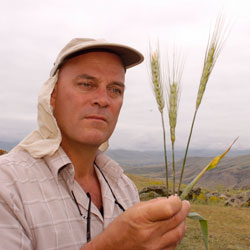

Dr Ken Street
TRANSFORMING LIVES AND LIVELIHOODS:
The Digital Revolution in Agriculture
7-8 August 2017, Canberra

| Conference Home Topic Overview Sir John Crawford Address Conference Program Speakers and Chairs Keynote Listeners Conference Scholars Conference & Scholar Sponsors Conference Media Registration Fees |
Dr Ken Street
Dr Ken Street Paper Crawford Fund Conference 2017 How to find rare traits in genebanks by using the Focused Identificaiton of Germplasm StrategyAbstract As the world moves forward into an uncertain future our agro-ecosystems will come under increasing pressure threatening our food security. In fact, climate change, dwindling water supplies, rising energy costs, the emergence of new pests and diseases, loss of arable land and population growth means that our crop plants will need to yield more on less land, with fewer inputs under increasingly harsh conditions. For this reason, plant breeders will be forced to mine global plant genetic resources collections for variation that can be used to future proof our crop plants. However, the genetic resource collections are large and we cannot afford to evaluate every accession in a collection as we hunt for desirable traits. The Focused identification of Germplasm Strategy (FIGS) was developed to help unlock the variation in genebanks and make it more accessible to the plant breeding community. This talk will explain how FIGS works and give examples of how rare traits have been uncovered by using the technology. |
 Dr Ken Street is a genetic resources scientist who has spent most of his scientific career involved in the collection and conservation of cereal and food legume agro-biodiversity. Based at the ICARDA genebank, situated in Aleppo Syria, Dr Street was responsible for undertaking numerous plant collection missions throughout Central and West Asia and the trans-Caucuses. In addition to his plant collecting missions, Dr Street was also involved in research aimed at improving the efficiency with which we mine genetic resource collections for useful traits. The outcome of this collaborative work was the Focused Identification of Germplasm Strategy (FIGS) that has been successfully deployed to discover rare crop traits that will have a positive impact in farmers fields.
Dr Ken Street is a genetic resources scientist who has spent most of his scientific career involved in the collection and conservation of cereal and food legume agro-biodiversity. Based at the ICARDA genebank, situated in Aleppo Syria, Dr Street was responsible for undertaking numerous plant collection missions throughout Central and West Asia and the trans-Caucuses. In addition to his plant collecting missions, Dr Street was also involved in research aimed at improving the efficiency with which we mine genetic resource collections for useful traits. The outcome of this collaborative work was the Focused Identification of Germplasm Strategy (FIGS) that has been successfully deployed to discover rare crop traits that will have a positive impact in farmers fields.